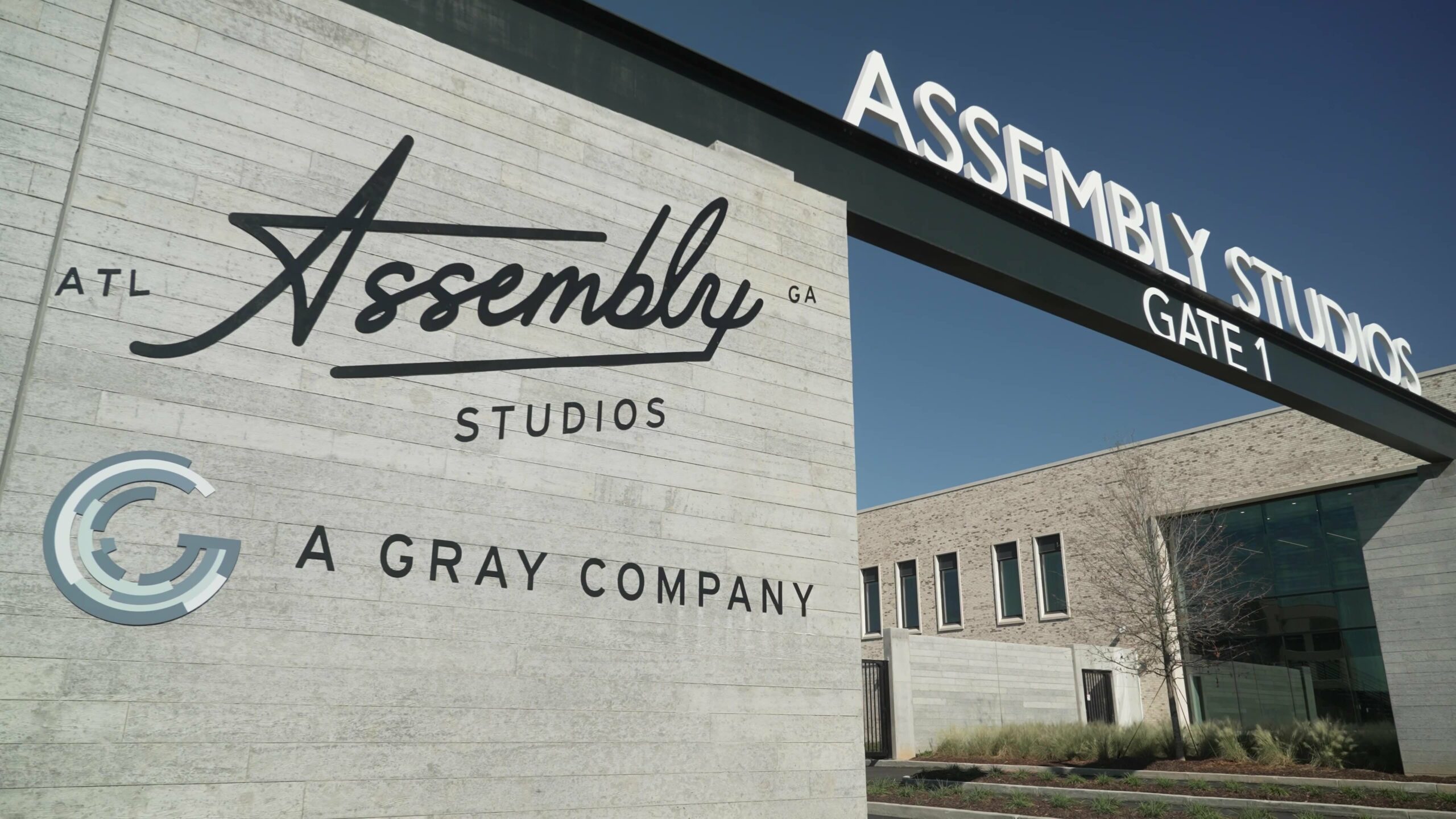With industry strikes in the rearview mirror, Assembly Atlanta is about to become the busiest it has been since its Phase I opening on November 9. The MARTA-accessible, 65-year-old repurposed GM plant in Doraville is now a creative hub owned by Atlanta-based Gray Television — one of the country’s largest owners of broadcast TV stations.
Phase I elements include production on 19 sound stages, backlot space, post-production services, support spaces and offices attached directly to the sound stages. The first phase encompasses 43 of Assembly’s 135 acres.
The backlot space contains exterior locations for productions to shoot, with facades that mimic streets in Europe, brownstones in New York, streetscapes with fire escapes, the French Quarter in New Orleans and others.
A 5-acre public park is also part of the development across from Assembly Atlanta’s façade and can be seen from I-285, just inside the perimeter.
Another notable aspect of Assembly Studios is who is calling it home — NBCUniversal, NBC’s entertainment division based out of New York and a subsidiary of Comcast.
“NBCUniversal is our anchor tenant and helps with operations and facilities management throughout the course of its lease,” said Justin Campbell, vice president of studio operations. Campbell joined Gray Television last year after managing Third Rail Studios, an Atlanta film and television production studio adjacent to Assembly Atlanta, now also owned by Gray.
“We’re leaning on a company that has done this for years,” Campbell noted of NBCUniversal. “It sets us apart operationally.”
Campbell is quick to add that Assembly Atlanta is not just for NBCU, though. “We’re open to all third parties, and there’s an opportunity for all studios large and small to have a space.”
While there are other studio complexes in Atlanta with film industry businesses located around them and communities nearby — such as Trilith — Campbell said that Assembly Atlanta’s creative hub is different.

“It’s even in our name,” he said. “It was historically the assembly plant of GM, but [today] ‘Assembly’ also means the creation of something — and a gathering of people.”
He added, “We’re a destination for content creators and an amphitheater in a public park. And we’ll continue to make this a sustainable creative hub in Georgia — a place where students from the Georgia Film Academy will be able to come and learn, script to screen.”
But film production is not all that Assembly Atlanta is about. It will also be a gathering of people.
“Looking to Phase II, we will be a mixed-use, live-work-play complex,” said Campbell. He pointed out that Assembly was designed by HGOR, a local planning and architecture company known for creating community-collaborative projects. As such, Phase II has other elements planned: retail, restaurants, condos, town homes, apartments, two hotels, a conference center and a nondenominational chapel.
Assembly Studios offers other amenities some film studios do not, such as an on-site commissary, according to Campbell, as well as a giant warehouse called Bender Warehouse, which is the largest building on the campus and houses NBCUniversal’s production services arm.
“A paint shop, wardrobe rental, grip and electrical equipment rental and everything on a classic Los Angeles lot is now brought here [through] NBCUniversal’s resources,” said Campbell.
Along with what’s new, film productions and their crews will also find nostalgia when they set up to shoot at Assembly Studios.
“There are a lot of pieces from the former GM plant, such as the original GM letters on the building. And we’ve kept the original tower and bridge people used to come into work at the plant,” Campbell said.
“Up until the plant’s closure, this was the heartbeat of Doraville and the surrounding area. It created 3,000 jobs at its peak. And we’ll create 4,000,” he added. “I think this development and this space are really a testament to what the film industry has become here. There’s been smart policy on the part of legislators to where we’re a global leader in this industry that [practically] didn’t exist here 16 years ago.”
The local film industry fortified by Assembly Atlanta will also fuel the live-work-play element, said Campbell. He looks forward to productions and crews flooding into Assembly Studios — and one day into its Phase II restaurants, retail shops and living spaces.
“Once fully complete, there will be these two economic engines pushing each other,” he said. “And there will be a new creative presence here in the Atlanta market.”
::
Carol Badaracco Padgett is an Atlanta freelance writer who specializes in film and television coverage. A graduate of the University of Missouri School of Journalism, her work has appeared in publications nationwide.





